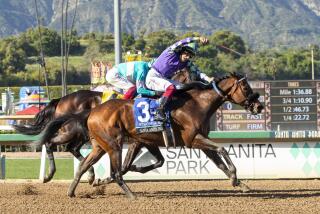Racing Is Precise in Its Terms
LOUISVILLE, Ky. — Thoroughbred racing may be the only sport in which the statistical records are not subject to interpretation.
The Daily Racing Form, official keeper of thoroughbred race statistics, makes sure readers know the difference between two 4-length wins or two 3/4-length defeats by including a terse one or two word description in the record of each and every race a horse runs.
The racing statistics of Kentucky Derby favorite Snow Chief--called past performances, or PPs, for short--tell us, for example, that the colt “rallied” to finish second by a neck to Louisiana Slew last October in the Sunny Slope Stakes at Santa Anita.
The choice of the word rallied was not capricious. The terms used in the PPs by the Form are both official and precise, having been taken directly from the horsemen’s own backstretch vocabulary.
The casual horseplayer or once-a-year Derby bettor, however, probably finds those words just a little obscure. Webster’s can’t tell you how Snow Chief’s 2 1/2-length victory in hand over top rival Badger Land in the El Camino Real Derby differed from his 1 3/4-length win in their next race, the Florida Derby.
But Graham Ross, a former Form chart caller who now works as publicist for Tampa Bay Downs, can.
“There are four ways of winning a race,” Ross said. “Hardest to easiest, they are driving, ridden out, handily and easily.
“A horse who wins driving is doing his best. He is fully extended. It doesn’t necessarily mean that he’s the best horse, just that he’s doing his best.
“Ridden out is the most subjective of the words we use,” Ross added. “To me, and to most chart callers, ridden out means the horse was less than fully extended but still was not the easiest of winners.
“Handily falls between easily and ridden out. “
The term easily means the same thing to chart callers as it does to laymen, Ross said, and a win described as just up means the horse didn’t nose into the lead until a couple of strides before the finish.
Second best also means what it says. “A horse described as second best probably beat the third horse by quite a bit but clearly wasn’t going to catch the winner, even if they went around again,” Ross said.
Gamely most often applies to a winning effort, in which a tiring or fully extended horse comes up with a little extra to hold off a challenger. But the phrase game try precludes a win. “That means the horse missed winning by a head or a nose after making up a noticeable distance,” Ross said.
Weakened means that the leader “tired in the very last stages, maybe in the last sixteenth or eighth of a mile, and was passed,” Ross said. “Gave way also means that a horse tired, threw it in. But he wasn’t necessarily in the lead. It might have been prompting (pushing) the leader.”
Rank post parade sounds awful but isn’t necessarily. A horse described that way was noticeably nervous when he came onto the track for his warmup. He was sweating or fighting to break free of his exercise pony.
Most horses who are rank in the post parade also are rank in the race, but some aren’t. Seattle Slew, for instance was rank in the post parade of his Kentucky Derby win.
Similarly, a horse who is described as tangled or as having broken in a tangle may or may not have lost.
“It’s my favorite word,” Ross said. “It means the horse’s feet and legs were all tangled up, like a foal’s, when he came out of the gate.
More to Read
Go beyond the scoreboard
Get the latest on L.A.'s teams in the daily Sports Report newsletter.
You may occasionally receive promotional content from the Los Angeles Times.










